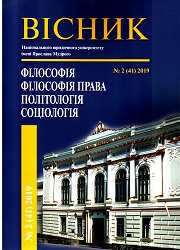АНТИКОРУПЦІЙНІ МАРКЕРИ В ПОЛІТИЧНІЙ СВІДОМОСТІ УКРАЇНЦІВ: СОЦІОЛОГІЧНИЙ АНАЛІЗ
ANTICORRUPTION MARKERS IN POLITICAL CONSCIOUSNESS OF UKRAINIANS: SOCIOLOGICAL ANALYSIS
Author(s): Olena Vоlоdymyrivna VolianskaSubject(s): Civil Society, Corruption - Transparency - Anti-Corruption
Published by: Національний юридичний університет імені Ярослава Мудрого
Keywords: civil society; anticorruption indicators; corruption; mass media; political consciousness; perception of corruption; understanding of corruption; corruption monitoring;
Summary/Abstract: Problem setting. Assessments of perception and attitude towards corruption are the basis of most of the monitoring of anticorruption potential in the world as well as in Ukraine. They are most often the subject of scientific discourse. However, unresolved issues are related not so much to the measurement as to the factors that determine the peculiarities of the perception of corruption.Analysis of actual research. The problem of corruption was widely studied in the works of such prominent Western scholars as G. Broadman, G. Davos, D. Kaufman, P. Mauro, V. Miller, S. Rose-Exerman, V. Dances, E. Tebaldi, J. Helman, M. Horton et al. Among the Russian and Ukrainian researchers, corruption problems should be mentioned by L. Bagryi- Shakhmatov, O. Baranovsky, A. Bovu, Y. Kuzminov, M. Melnyk, T. Koshechkin and others like that. Issues of effective prevention and counteraction of corruption, implementation of anticorruption policy, cooperation between civil society and authorities in combating corruption were investigated by Ukrainian researchers such as V. Martynenko, A. Mikhnenko, E. Makarenko, S. Kravchenko, O. Sosnin, Yu. Kannish, E. Nevmerzhitsky and many others.The purpose of this article is the analysis the factors that determine the peculiarities of perceptions of corruption in Ukraine and thus explain the phenomenon of low anticorruption potential.Presenting the main material. Corruption counteraction requires definite and consistent ideas about the essence and forms of corrupt behavior. In other words, in the course of development and implementation of a national anticorruption policy, it is important to consider existing standards or stereotypes in the understanding of corruption. People rely on such standards in their assessments of various dimensions of corruption, which, sometimes, differ from a legislative vision of the essence and forms of corruption entirely. In the countries where the process of implementation of the international anticorruption conventions containing fundamental or model descriptions of elements of corruption crimes has not been completed, the picture is even more complicated. For instance, prior to June 2009 (the first attempt to pass “the anticorruption package”), only an insignificant number of administrative offences was classified as corruption under the Ukrainian law. At the same time, various types of actions were regarded as corruption both by the public and by politicians.From a legal standpoint, there is presumed knowledge of the law. In other words, for the purposes of law enforcement, it is presumed that every citizen is aware of the types of actions that are considered corruption crimes or administrative corruption offences in a given society. However, social reality considerably deviates from the regulatory model of the anticorruption laws. Besides, the problem in this case is much more complex than a mere knowledge of respective legal provisions.Conclusions. In the public opinion, corruption may take various forms; and a model described in an anticorruption law is not always acceptable for people. Moreover, there are types of actions that look like corruption but are not corruption from a legal perspective; conversely, circumstances that may not look corrupt at first sight are corruption under the law. It is very important to determine how respondents understand corruption and how they distinguish its various forms in specific everyday situations. From a sociocultural perspective, perceived assessments of corruption depend on the public conceptions of corruption.The problem has received essentially no attention in the studies conducted in Ukraine. To an extent, an explanation could be that there were no legal experts in the research groups carrying these surveys out and that the conceptions of sociologists in respect of corruption were, at best, incomplete or superficial, because they covered only most common forms of corrupt conduct, i.e. bribery and abuse of power. Legal subtleties associated with the definition of offenders, elements of crime, types of liability and correlation between moral and legal aspects etc. have been left without attention of the methodology designers.In this case, these findings could be used as «background information» in the interpretation of findings received in respect of the public perceptions of corruption and the extent of involvement in corrupt relations.
Journal: Вісник НЮУ імені Ярослава Мудрого. Серія: Філософія, філософія права, політологія, соціологія
- Issue Year: 41/2019
- Issue No: 2
- Page Range: 118-131
- Page Count: 14
- Language: Ukrainian

